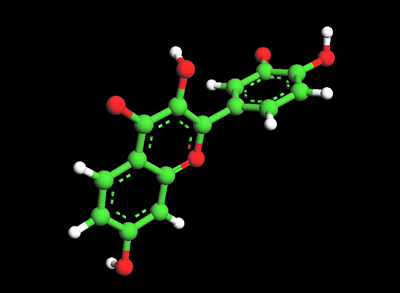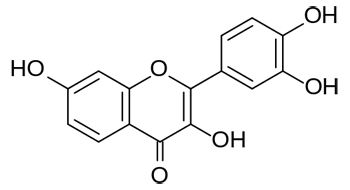Fisetin Molecule - Slows Aging
Natural product found to reduce the level of damaged cells in the body, caused by aging

Fisetin Molecule (above) Ball-and-stick. For 3D Jsmol File.
Molecular formula C15H10O6
Molar mass 286.2363 g/mol

Fisetin (3,3′,4′,7-tetrahydroxyflavone, above) is a polyphenol which is a bioactive flavonol molecule found in fruits and vegetables such as strawberry, apple, persimmon, grape, onion, and cucumber at concentrations in the range of 2–160 μg/g.
Fisetin, like other polyphenols such as resveratrol, is a sirtuin-activating compound and has been shown in laboratory studies to extend the life of simple organisms like yeast, worms, and flies. see: A Molecular Mechanism for Direct Sirtuin Activation by Resveratrol .
Fisetin has shown anti-cancer activity in studies on cells and model animals conducted in laboratories, and appears to block the >PI3K/AKT/mTOR pathway. See:
Dietary flavonoid fisetin: A novel dual inhibitor of PI3K/Akt and mTOR for prostate cancer management.
In lab studies it also has been shown to be an anti-proliferative agent, interfering with the cell cycle in several ways.--
--Downregulation of tumor necrosis factor and other proinflammatory biomarkers by polyphenols
--The Natural Flavonoid Fisetin Inhibits Cellular Proliferation of Hepatic, Colorectal, and Pancreatic Cancer Cells through Modulation of Multiple Signaling Pathways
Fisetin, like some other flavonoids, has been found in lab studies to be a topoisomerase inhibitor, which may turn out to be a carcinogenic activity or an anti-cancer activity - further research is needed. The dietary flavonoids myricetin and fisetin act as dual inhibitors of DNA topoisomerases I and II in cells.
Fistein has been shown to be an effective senolytic agent in wild-type mice, with effects of increased lifespan, reduced senescence markers in tissues, and reduced age-related pathologies. A clinical trial in the U.S. is currently underway as of October 2018 to show effectiveness in humans. (Clinical Trials.gov -- Alleviation by Fisetin of Frailty, Inflammation, and Related Measures in Older Women (AFFIRM) ).
In studies conducted on cells in a laboratory, fisetin inhibits the activity of several pro-inflammatory cytokines, including tumor necrosis factor alpha, interleukin 6, and Nuclear factor kappa B. It has also been shown in lab studies to upregulate glutathione, an endogenous antioxidant. Fisetin Boosts Cellular Glutathione .